Background checks typically range from $10 to over $100, depending on their purpose and scope. Low-cost checks in the $10–$30 range may be sufficient for personal use—such as screening a babysitter, researching a dating prospect or satisfying general curiosity—but they are not legally suitable for employment, tenant screening or other regulated business decisions, especially in the service industry where verifying licensing credentials is critical.
For professional purposes, a basic, Fair Credit Reporting Act–compliant background check generally starts around $30 and can exceed $100 when additional elements like employment verification, motor vehicle records (MVR) or drug testing are included. These comprehensive background checks reduce hiring risk, ensure regulatory compliance and provide greater peace of mind.
Here’s how the depth of information impacts pricing:
| Type of Background Check | Typical Cost | Details |
|---|---|---|
| Basic Criminal & Identity Check | $30–$50 | Social Security number trace, national criminal database, sex offender registry |
| Standard Employment Check | $50–$80 | Adds employment and education verification |
| Comprehensive with Add-ons | $80–$150+ | Includes MVR, credit check, drug testing, global watchlist and more |
What Can Be Covered in a Background Check?
- Identity Verification: Confirms name, Social Security number and address history
- Criminal Records Check: Searches local, state and federal databases
- Credit Check: Evaluates financial responsibility (commonly used by landlords and finance-related employers)
- Employment and Education Verification: Confirms past jobs and academic credentials
- Driving Records (MVR): Required for transportation and field service roles
- Drug Screening: Common in safety-sensitive or regulated industries
- Contractor Checks: Includes license verification, insurance validation and in some cases, continuous monitoring
Small businesses may reduce background check costs using pay-as-you-go plans, while larger organizations often prefer application programming interface (API)–based solutions for high-volume, integrated screening. For service-industry employers hiring contractors, ongoing monitoring and license validation are essential for compliance and liability protection.
Trades and Skilled Labor (Frequently Contracted)
These are some of the most commonly contracted, licensed roles in residential, commercial and facilities-based service industries requiring more in-depth background checks. Businesses in the following industries benefit from vetting these roles through trusted platforms like PlusOne Solutions:
- Electricians
- Plumbers
- HVAC technicians
- General contractors
- Appliance repair technicians
- Roofers
- Carpenters
- Pest control specialists
These professionals typically operate as independent contractors or subcontractors. They are usually required to maintain active local or state licenses, carry general liability insurance and, in some cases, post surety bonds.
Why Contractor Vetting Matters
Vetting contractors in the service industry is critical for protecting your business, clients and reputation—especially when workers are entering homes or commercial spaces. PlusOne Solutions is uniquely equipped to meet the specific regulatory requirements of this sector, offering license verification, insurance tracking and badging. This is especially valuable in fields like HVAC, electrical, plumbing and appliance repair.
Benefits Include:
- Reduced risk and liability
- Greater peace of mind for clients and business owners
- Streamlined contractor oversight across multiple locations or franchises
To fully mitigate risk and ensure compliance, businesses should follow a structured vetting process. Here’s a comprehensive checklist:
- Verify Identity and Legal Status
- Validate their tax ID or social security number
- Cross-check contact details (physical address, phone, email) for consistency
- Check Licenses and Certifications
- Confirm state or municipal trade licenses
- Review certifications like NATE (HVAC), EPA credentials or manufacturer-specific training
- Use services like PlusOne Solutions for ongoing license monitoring
- Perform Criminal Background Checks
- Conduct national and county-level searches
- Ensure FCRA compliance through an approved background check vendor
- Consider continuous monitoring for long-term or recurring contractors
- Verify Insurance and Bonding
- Request certificates of insurance with valid coverage and expiration dates
- Confirm workers’ compensation coverage if the contractor has employees
- Ask for proof of bonding if applicable
- Check References and Work History
- Speak with recent clients about quality, timeliness and professionalism
- Review portfolios or photos of past work
- Understand the contractor’s experience with project scopes similar to yours
- Review Driving Records (If Relevant)
- Pull MVRs for contractors who drive company vehicles or transport goods
- Use continuous MVR monitoring to reduce liability
- Validate Employment Eligibility
- Use E-Verify where required to confirm U.S. work eligibility
- Maintain I-9 forms for all directly employed contractors
How Do I Choose a Background Check Service?
Select a provider that is FCRA-compliant, offers up-to-date data and clearly outlines pricing. Prioritize services with strong security protocols, transparent reporting and fast turnaround times. Look for accreditations such as those from the Professional Background Screening Association (PBSA).
Scalable pricing is especially important for small businesses, while larger companies benefit from integrated, subscription-based solutions.
How Do Pre Employment Background Checks Work?
Employers typically initiate a background check after a conditional job offer. Third-party providers handle the screening, which may include identity validation, criminal record searches, employment and education verification, credit checks and drug testing. Under FCRA, employers must obtain written consent and disclose any adverse actions taken as a result of the report.
What Are the Legal Requirements for Background Checks?
Under the Fair Credit Reporting Act:
- Employers must get written authorization
- Applicants must be notified if a report is used to make an adverse decision
- Individuals must have a chance to dispute incorrect information
States may have additional restrictions on credit checks and the use of criminal records.
What Are the Laws Regarding Tenant Background Checks?
Landlords must comply with both FCRA and the Fair Housing Act. Written consent is required, and applicants must be informed of any adverse actions. Some cities and states also restrict the use of a criminal history check in tenant decisions. For example, California Civil Code Section 1950.6 limits screening charges to $59.67 as of 2024.
What Is the Cheapest Background Check Service?
For non-professional purposes, platforms like BeenVerified, TruthFinder and PeopleLooker offer subscription models starting around $22–$30 per month. These allow multiple personal-use searches but are not FCRA-compliant and should not be used for hiring, tenant screening or contractor vetting. Providers like PlusOne Solutions offer FCRA-compliant, contractor-focused services including license monitoring and badging and traditional employee screening—cost more but cover more.
Are Free Background Checks Reliable?
Most free services compile data from public sources, which can be incomplete, outdated or inaccurate. They also lack legal standing for regulated decisions. Paid, FCRA-compliant checks are the safer choice for businesses and landlords.
How Long Does a Background Check Take?
Turnaround time varies by depth and provider:
- Basic online checks: Within minutes to a few hours
- Professional employment checks: 1–5 business days
- Checks involving manual verifications or international records: 5+ days
Why are Background Checks Important to Businesses?
Background checks reduce risk and protect businesses from costly mistakes—whether it’s hiring an unqualified employee, working with an unlicensed contractor or renting to a high-risk tenant. While basic checks may suffice for personal situations, business and legal decisions require compliant, comprehensive solutions.
Choose providers that offer FCRA compliance, fast turnaround, and strong data security. For contractor-heavy industries like HVAC, electrical and plumbing, platforms like PlusOne Solutions offer added protection through license monitoring, insurance tracking and ongoing compliance oversight.
How PlusOne Solutions Works
To get started, the hiring organization registers with PlusOne Solutions and invites contractors to complete background screening and documentation. Contractors are guided through the process, which may include criminal background checks, drug testing, MVRs and license verification, depending on the program.
Hiring organizations retain visibility into each contractor’s compliance status, allowing them to enforce standards, reduce liability and meet regulatory requirements. This structured approach protects both the business and the clients it serves.




